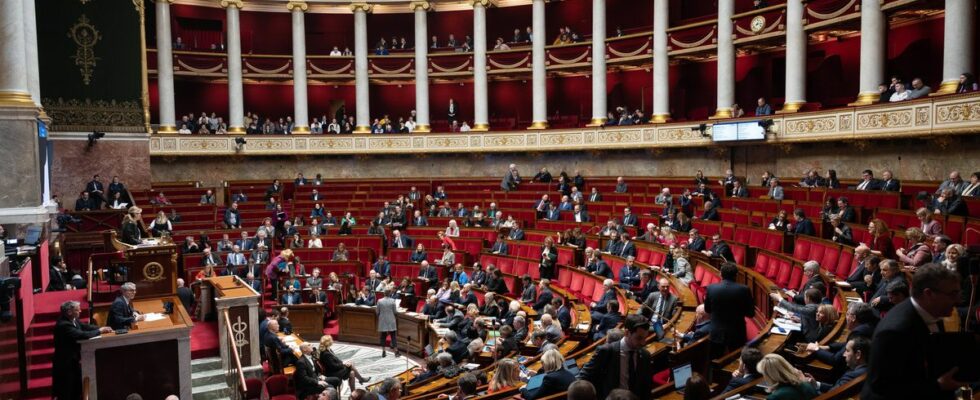The protest has already taken to the streets since January 19, the first day of mobilization against the pension reform. She moves this Monday on the parliamentary ground. And the battle in the Hemicycle of the Palais-Bourbon promises to be an obstacle course for the government. Between temporality, amendments by the thousands and the weapon of 49.3 in ambush, 20 minutes has looked into this parliamentary debate for you.
Motion time
The debate opens this Monday at 4 p.m. with a motion to reject the Nupes, in an attempt to reject the bill from the outset. It makes it possible to reject the reform, even before any debate in the Hemicycle.
It will then be the turn of the “referendum motion” to be presented. The latter aims to request a referendum on the pension reform but it has little chance of being adopted by the National Assembly. Indeed, only the motion of the National Rally will be submitted to the vote of the deputies, to the chagrin of the left which denounces a “democratic diversion”. A myriad of left-wing deputies refuse to vote for a motion presented by the extreme right.
According to the leader of the deputies La France insoumise Mathilde Panot, it is a “comfortable opposition” for the government because the motion of the Nupes had, according to her, a chance of being adopted. A third motion could be tabled on Monday by the Freedoms, Independents, Overseas and Territories (LIOT) group. If the referendum motion were accepted, it would then be sent to the Senate for consideration. However, even if both chambers endorse the idea of a referendum, President Emmanuel Macron may refuse to conduct one.
The time for amendments
As in 2020, the National Assembly will face a tsunami of amendments. Some 20,000 amendments were tabled, more than half of them by La France Insoumise. However, these amendments could be reduced to a bare minimum. The administrators of the Hemicycle examined them this weekend in order to exclude those which are deemed “inadmissible” when they “create a charge for the State” (article 40 of the Constitution) or when they have no direct link with the proposed reform.
Faced with the 13,000 amendments tabled by the Nupes, the government spokesman, Olivier Véran, considered that it was a “stupid and nasty obstruction”. “20,000 amendments is to make believe that we want the debate and oppose the violence of the obstruction”, was annoyed Olivier Dussopt this Monday on Europe 1. Elisabeth Borne had said to hope “a real debate, project against project “, instead of “caricatures” until then, according to her. But this flow of amendments “makes it possible to manage the tempo a little, to accelerate, to slow down”, instead of letting the rhythm be dictated, opposes the Insoumis François Ruffin, who wants with the Nupes to be able to relay in the Hemicycle “the life of people”, “the France of reality”.
Time (too) short
Because the government has decided to play for time. The executive is indeed using an amending budget from Social Security in order to force the deputies to come to a decision within a very limited period of time. If the Assembly does not overcome the amendments by midnight February 17, the text will pass to the Senate. The recourse to the procedure of article 47.1 of the Constitution regulates the deadlines for parliamentary examination of a draft Social Security budget. It limits the duration of debates to twenty days in the National Assembly and fifteen days in the Senate.
For LFI deputy Alexis Corbière on CNews, there is a “democratic subject” because with this method, “there may not even be a majority in the National Assembly” and the text could be imposed by arrangement. This constrained schedule is strongly criticized by the oppositions, which nevertheless intend to manage to discuss article 7 devoted to the postponement of the retirement age. After the examination of the upper house, deputies and senators will try to agree in a joint committee. If there is agreement, it must be validated by both chambers. Otherwise the text will make a last shuttle and the Assembly will have the last word.
The Parliament must decide in total in fifty days, that is to say by March 26 at midnight, otherwise the provisions of the reform can be implemented by ordinance, provides for the Constitution. It never happened.
The time of the executive’s weapon
Before the deadline, the executive can at any time before the Assembly trigger article 49.3 of the Constitution if the votes on the amendments do not turn in its favor. Or if he thinks he does not have an absolute majority for the vote on the entire reform, because of defections from the Macronists or LR.
But, officially, the government absolutely wants to avoid a new 49.3. The Prime Minister has already used this weapon 10 times since the last legislative elections and Elisabeth Borne even carries it on her person, since at Christmas her collaborators offered her a football jersey from the French team flocked “49.3”. The executive therefore hopes to do without yet another 49.3 which would be perceived in public opinion as a new passage in force. Especially since, according to the latest Ifop poll for the JDD published this Saturday, 69% of French people are still opposed to the reform.
“I do not see too much interest in a 49.3 at first reading, the text can pass to the Senate without a vote” if all the articles could not be discussed, recalls a Macronist executive. But “in final reading” in March, “we are not certain. There may be a 49.3” if too many LR deputies are lacking. If necessary, the oppositions would retaliate with “motions of censure”, in an attempt to bring down the government. Only one motion was successful under the Fifth Republic, on October 5, 1962, overthrowing the government of Georges Pompidou.

